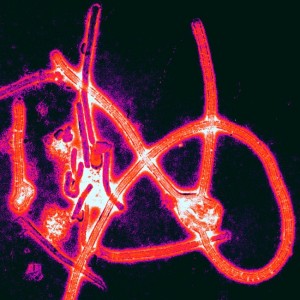
Scary, color-enhanced electron micrograph of Ebola virus particles. Creative Commons license courtesy of Thomas W. Geisbert, Boston University School of Medicine.
With the death toll now over 700 in an Ebola outbreak that has been building since February, Americans are suddenly up in arms about the virus, but only because it was announced yesterday that up to two Americans infected with the virus may be transported to Atlanta for treatment. Yes, the virus is especially deadly, with a death rate of 70-90% of infected patients, but the virus does not spread particularly efficiently and is not airborne. Writing at CNN.com, biologist Laurie Garrett points out a disaster scenario for the virus. Rather than an outbreak in the US, which seems extremely unlikely, Garrett outlines how the virus could spread in the much more densely populated Nigeria rather than the more remote areas of Guinea, Sierra Leone and Liberia where it is now concentrated.
Before getting into the details of the current outbreak and its possible spread to Nigeria, a little background on the virus. From the World Health Organization, we have this information on how the virus spreads:
Ebola is introduced into the human population through close contact with the blood, secretions, organs or other bodily fluids of infected animals. In Africa, infection has been documented through the handling of infected chimpanzees, gorillas, fruit bats, monkeys, forest antelope and porcupines found ill or dead or in the rainforest.
Ebola then spreads in the community through human-to-human transmission, with infection resulting from direct contact (through broken skin or mucous membranes) with the blood, secretions, organs or other bodily fluids of infected people, and indirect contact with environments contaminated with such fluids. Burial ceremonies in which mourners have direct contact with the body of the deceased person can also play a role in the transmission of Ebola. Men who have recovered from the disease can still transmit the virus through their semen for up to 7 weeks after recovery from illness.
Of particular relevance to the two patients who may be transported to Atlanta for treatment (they work for Samaritan’s Purse, an aid organization) and the tragic death of Sheik Umar Khan, Sierra Leone’s top Ebola doctor, the information from WHO continues:
Health-care workers have frequently been infected while treating patients with suspected or confirmed EVD. This has occurred through close contact with patients when infection control precautions are not strictly practiced.
The fact that these health care givers become infected because standard infection control precautions are not strictly practiced in no way should suggest that they are uninformed or careless. Instead, Garrett points out in her article the stark realities facing health care providers in the three countries where the outbreak rages:
To show how ill-equipped these nations are to battle disease, per capita spending on health care, combining personal and governmental, amounts to only $171 a year in Sierra Leone, $88 a year in Liberia and $67 a year in Guinea, according to the Kaiser Foundation.
For those who want more detail on the virus, this succinct summary of the structure of the Filovirus family of viruses and their mode of operation is very informative.
For the panic-motivated hypochondriacs among us, initial symptoms of this virus mimic the onset of most other viral infections.
The most recent update from WHO on the outbreak can be read here. The update summarizes the assistance that is being provided to the countries where the outbreak is ongoing. Significantly, WHO is not advocating travel restrictions at this time.
Returning to Garrett’s article, she points out the factors that would lead to chaos should Ebola spread in Nigeria:
Were Ebola to take hold in that country [Nigeria], spreading from person-to-person in a densely populated, chaotic city such as Lagos, the worldwide response would swiftly spin into uncharted political and global health territory.
Consider the following: Nigerian physicians are on strike nationwide; hundreds of girls have been kidnapped from their schools and villages over the past six months by Boko Haram Islamist militants — and none has been successfully freed from their captors by the Abuja government.
Nigeria is in the midst of national election campaigning. President Goodluck Jonathan’s government is, at best, weak. The nation is torn apart by religious tension, pitting the Muslim north against the Christian south. Islamists in the north have long distrusted Western medicine. They have opposed polio vaccination and have kidnapped and assaulted central government health providers.
Garrett’s plea is for an already-planned African summit on Monday to be used to develop a coordinated plan for dealing with the virus:
One way or another, Obama must take advantage of Monday’s Africa summit to press the case for calm and appropriate responses. These would include specific post-Ebola financial commitments to Liberia, Sierra Leone and Guinea.
The possibility that the epidemic might take hold in Nigeria must be confronted, and plans of action must be considered. The world cannot afford to make decisions in the heat of panic about such things as international airport closures, withdrawal of foreign oil workers, negotiations for outbreak responses with northern imams, hospital and clinic infection control training across thousands of Nigerian health facilities, deployment of international assistance teams for rapid diagnostics and lab assistance and countless other contingencies.
Sadly, Garrett points out important information on the damage that has already been done in this outbreak:
When this Ebola epidemic eventually ends, the health budgets of these nations [Liberia, Sierra Leone and Guinea] will have been bankrupted, and many of their most skilled and courageous physicians, nurses, Red Cross volunteers and hospital workers will have perished.
Let’s hope that Monday sees the beginning of stronger coordination to put more resources where they are needed to halt the spread of this ongoing disaster.